Donald Trump: The Making of a World View
Brendan Simms and Charlie Laderman
Endeavour Press, January 2017
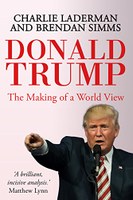
On November 8, 2016, Donald Trump won the American presidential election, to the joy of some and the shock of many across the globe. Now that Trump is Commander-in-Chief of the most powerful country on Earth, Americans and non-Americans alike have been left wondering what that means for the world. It has been widely claimed that Trump's foreign policy views are impulsive, inconsistent and that they were improvised on the campaign trail.
Drawing on interviews from as far back as 1980, Charlie Laderman and Brendan Simms show that this assumption is dangerously false. Laderman and Simms reveal that Trump has had a consistent position on international trade and America’s alliances since he first flirted with the idea of running for president in the late 1980s. Furthermore, his foreign policy views have deep roots in American history.
This book reveals how the worldview of the 45th President of the United States was formed, what might result if it is applied in policy terms and the potential consequences for the rest of the world.
The UK's Journeys into and out of the EU: Destinations Unknown (Europa EU Perspectives: Reform, Renegotiation, Reshaping)
Julie Smith
 This Routledge Focus aims to investigate and analyse the United Kingdom’s relationship with the European Communities (EC) and the European Union (EU). Since joining the EC in 1973, the UK has had a fraught relationship with the organization, declining closer economic union in the eurozone and, often, arguing against closer political union.
This Routledge Focus aims to investigate and analyse the United Kingdom’s relationship with the European Communities (EC) and the European Union (EU). Since joining the EC in 1973, the UK has had a fraught relationship with the organization, declining closer economic union in the eurozone and, often, arguing against closer political union.
While some 67% of the UK’s voters opted to remain in the EC in a referendum held in 1975, by June 2016 a narrow majority favoured leaving the EU. This volume evaluates the UK’s journey into the Union, and examines how the country’s voters came to decide on Brexit, and where the UK’s departure from the EU may lead it.
The Despot's Guide to Wealth Management: On the International Campaign against Grand Corruption
Jason Sharman
Cornell University Press, March 2017
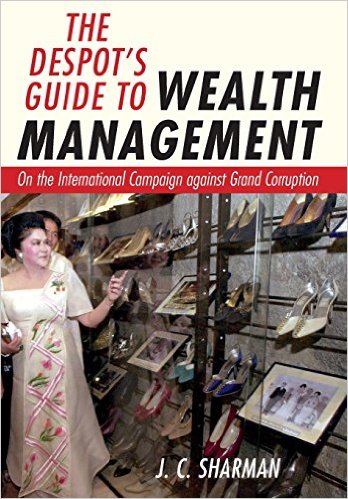
An unprecedented new international moral and legal rule forbids one state from hosting money stolen by the leaders of another state. The aim is to counter grand corruption or kleptocracy ("rule by thieves"), when leaders of poorer countries―such as Marcos in the Philippines, Mobutu in the Congo, and more recently those overthrown in revolutions in the Arab world and Ukraine―loot billions of dollars at the expense of their own citizens.
This money tends to end up hosted in rich countries. These host states now have a duty to block, trace, freeze, and seize these illicit funds and hand them back to the countries from which they were stolen.
In The Despot's Guide to Wealth Management, J. C. Sharman asks how this anti-kleptocracy regime came about, how well it is working, and how it could work better. Although there have been some real achievements, the international campaign against grand corruption has run into major obstacles. The vested interests of banks, lawyers, and even law enforcement often favor turning a blind eye to foreign corruption proceeds. Recovering and returning looted assets is a long, complicated, and expensive process.
The Emergence of Globalism:
Visions of World Order in Britain and the United States, 1939–1950
Or Rosenboim
Princeton University Press, March 2017
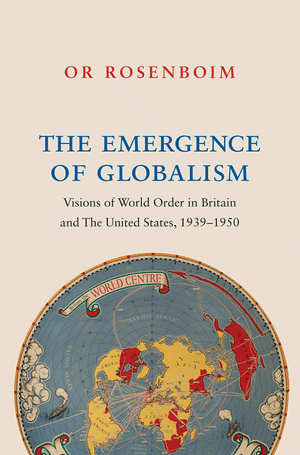
During and after the Second World War, public intellectuals in Britain and the United States grappled with concerns about the future of democracy, the prospects of liberty, and the decline of the imperial system. Without using the term "globalization," they identified a shift toward technological, economic, cultural, and political interconnectedness and developed a "globalist" ideology to reflect this new postwar reality. The Emergence of Globalism examines the competing visions of world order that shaped these debates and led to the development of globalism as a modern political concept.
Leviathan
Thomas Hobbes, Christopher Brooke (Edited by)
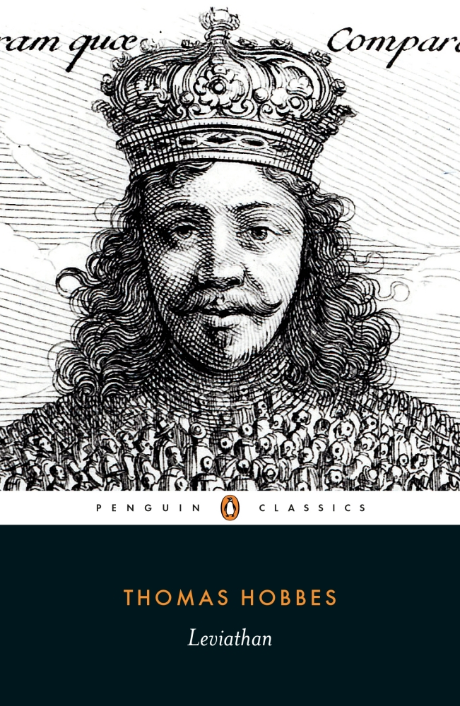
'The life of man, solitary, poore, nasty, brutish, and short'
Written during the chaos of the English Civil War, Thomas Hobbes' Leviathan asks how, in a world of violence and horror, can we stop ourselves from descending into anarchy? Hobbes' case for a 'common-wealth' under a powerful sovereign - or 'Leviathan' - to enforce security and the rule of law, shocked his contemporaries, and his book was publicly burnt for sedition the moment it was published. But his penetrating work of political philosophy - now fully revised and with a new introduction for this edition - opened up questions about the nature of statecraft and society that influenced governments across the world.
From Global To Local:
The making of things and the end of globalisation
Finbarr Livesey
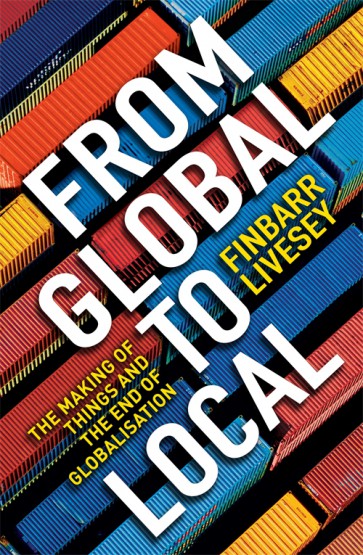
For the past thirty years or more, the global economy has been run based on three big assumptions: globalisation will continue to increase; trade is the route to growth and development; and economic power is moving from West to East. But what if all these are wrong? From Global to Local shows how the world trading structure has already begun to shift, with irrevocable consequences for the global economy. Volatile oil prices, the pressures of sustainability and the availability of new technologies - such as 3D printing and automation - mean that companies, from General Electric to Apple, are beginning to move production away from distant countries and back home.
If robots can make everything, why would companies use Chinese workers? Power is shifting, trade is shrinking and making things is revolutionising. Finbarr Livesey explores the making of this new world economic order, revealing the processes that lie behind it and showing how no one will be left untouched by its arrival.
The Formation of Turkish Republicanism
Banu Turnaoglu
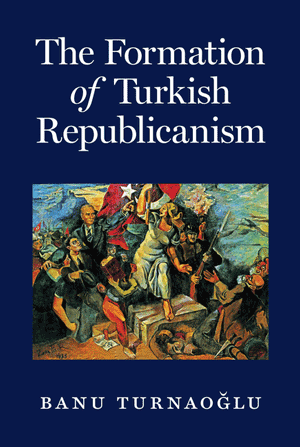
Turkish republicanism is commonly thought to have originated with Mustafa Kemal Atatürk and the founding of modern Turkey in 1923, and understood exclusively in terms of Kemalist ideals, characterized by the principles of secularism, nationalism, statism, and populism. Banu Turnaoğlu challenges this view, showing how Turkish republicanism represents the outcome of centuries of intellectual dispute in Turkey over Islamic and liberal conceptions of republicanism, culminating in the victory of Kemalism in the republic's formative period.
Drawing on a wealth of rare archival material, Turnaoğlu presents the first complete history of republican thinking in Turkey from the birth of the Ottoman state to the founding of the modern republic. She shows how the Kemalists wrote Turkish history from their own perspective, presenting their own version of republicanism as inevitable while disregarding the contributions of competing visions. Turnaoğlu demonstrates how republicanism has roots outside the Western political experience, broadening our understanding of intellectual history. She reveals how the current crises in Turkish politics—including the Kurdish Question, democratic instability, the rise of radical Islam, and right-wing Turkish nationalism—arise from intellectual tensions left unresolved by Kemalist ideology.
Oil and the Western Economic Crisis
Helen Thompson
Palgrave Macmillan, 2017

This book explains the place of oil in the economic and political predicaments that now confront the West. Thompson explains the problems that the rising cost of oil posed in the years leading up to the 2008 crash, and the difficulties that a volatile oil market now poses to economic recovery under the conditions of high debt, low growth and quantitative easing. The author argues that the 'Gordian knot' created by the economic and political dynamics of supply and demand oil in the present international economy poses a fundamental challenge to the assumption of economic progress embedded in Western democratic expectations.
Hierarchies in World Politics
Ayse Zarakol
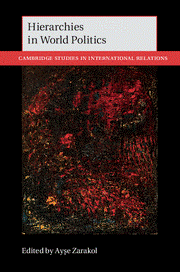
Globalizing processes are gathering increased attention for complicating the nature of political boundaries, authority and sovereignty. Recent examples of global financial and political turmoil have also created a sense of unease about the durability of the modern international order and the ability of our existing theoretical frameworks to explain system dynamics.
In light of the inadequacies of traditional international relation (IR) theories in explaining the contemporary global context, a growing range of scholars have been seeking to make sense of world politics through an analytical focus on hierarchies instead. Until now, the explanatory potential of such research agendas and their implications for the discipline went unrecognized, partly due to the fragmented nature of the IR field.To address this gap, this ground-breaking book brings leading IR scholars together in a conversation on hierarchy and thus moves the discipline in a direction better equipped to deal with the challenges of the twenty-first century.
When the State Meets the Street: Public Service and Moral Agency
Bernardo Zacka
Havard University Press, September 2017
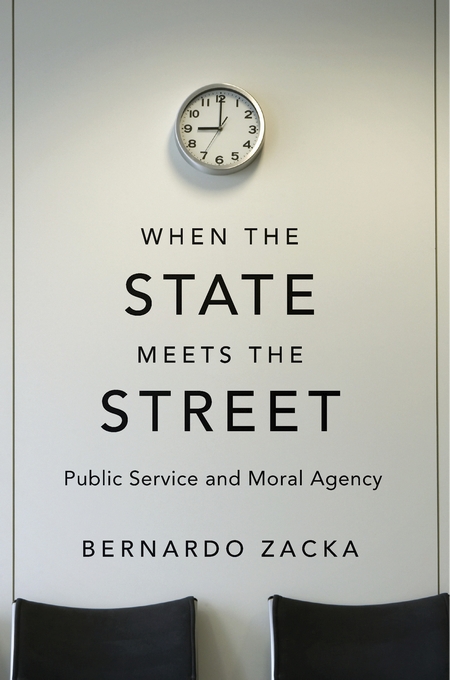
When the State Meets the Street probes the complex moral lives of street-level bureaucrats: the frontline social and welfare workers, police officers, and educators who represent government’s human face to ordinary citizens. Too often dismissed as soulless operators, these workers wield a significant margin of discretion and make decisions that profoundly affect people’s lives. Combining insights from political theory with his own ethnographic fieldwork as a receptionist in an urban antipoverty agency, Bernardo Zacka shows us firsthand the predicament in which these public servants are entangled.
Public policy consists of rules and regulations, but its implementation depends on how street-level bureaucrats interpret them and exercise discretionary judgment. These workers are expected to act as sensible moral agents in a working environment that is notoriously challenging and that conspires against them. Confronted by the pressures of everyday work, they often and unknowingly settle for one of several reductive conceptions of their responsibilities, each by itself pathological in the face of a complex, messy reality. Zacka examines the factors that contribute to this erosion of moral sensibility and what it takes to remain a balanced moral agent in such difficult conditions.
History and Nationalist Legitimacy in Contemporary China: A Double-Edged Sword
Robert Weatherley and Qiang Zhang
Palgrave Macmillan, September 2017
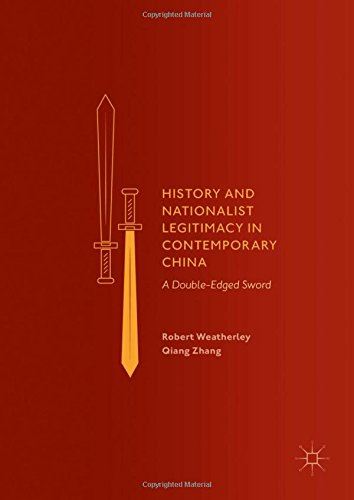
This book examines how the Chinese Communist Party (CCP) has attempted to bolster its nationalist legitimacy through the utilisation of Chinese history. The authors identify two different modes of nationalism - aggressive and consensual - both of which are linked to the historical memory of the late Qing Dynasty and Republican era. Aggressive nationalism dwells on China’s traumatic “century of humiliation” and is intended to incite popular resentment towards former imperialist powers (particularly Japan and the US) whenever they are deemed to still be acting in a provocative manner in their dealings with China.
The aim is to remind the Chinese people that the CCP liberated China from imperialism after 1949 and has since restored national pride. Consensual nationalism is more conciliatory, emphasising common historical ties with the Guomindang (KMT) during the Second Sino-Japanese War and the Republican era. Here, the CCP is trying to promote itself as the party of national harmony and unity, with the long-term objective being peaceful reunification with Taiwan. However, the public response in China has not always been supportive of the CCP’s claims to be the sole defender of Chinese national interests. Some critics have suggested that China would have been better off if the KMT had won the civil war instead of the CCP. Others have insisted that the party is hopelessly weak on issues of national importance and that China is no stronger now than it was during the final throes of the much-hated Qing Dynasty. This book will be of interest to research students and scholars of Chinese politics, history and international relations.
After Rape: Violence, justice and social harmony in Uganda
Holly Porter
Cambridge University Press, January 2017
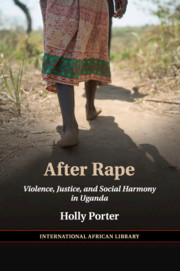 Following the ICC intervention in 2005, northern Uganda has been at the heart of international justice debates. The emergent controversy, however, missed crucial aspects of Acholi realities: that the primary moral imperative in the wake of wrongdoing was not punishment but, instead, the restoration of social harmony. Drawing upon abundant fieldwork and in-depth interviews with almost 200 women, Holly Porter examines issues surrounding wrongdoing and justice, and sexual violence and rape, among the Acholi people in northern Uganda. This intricate exploration offers evidence of a more complicated and nuanced explanation of rape and its aftermath, suggesting a re-imagining of the meanings of post-atrocity justice, whilst acknowledging the role of sex, power and politics in all sexual experiences between coercion and consent. With its wide investigation of social life in northern Uganda, this provocative study offers vital analysis for those interested in sexual and gender violence, post-conflict reconstruction and human rights.
Following the ICC intervention in 2005, northern Uganda has been at the heart of international justice debates. The emergent controversy, however, missed crucial aspects of Acholi realities: that the primary moral imperative in the wake of wrongdoing was not punishment but, instead, the restoration of social harmony. Drawing upon abundant fieldwork and in-depth interviews with almost 200 women, Holly Porter examines issues surrounding wrongdoing and justice, and sexual violence and rape, among the Acholi people in northern Uganda. This intricate exploration offers evidence of a more complicated and nuanced explanation of rape and its aftermath, suggesting a re-imagining of the meanings of post-atrocity justice, whilst acknowledging the role of sex, power and politics in all sexual experiences between coercion and consent. With its wide investigation of social life in northern Uganda, this provocative study offers vital analysis for those interested in sexual and gender violence, post-conflict reconstruction and human rights.
